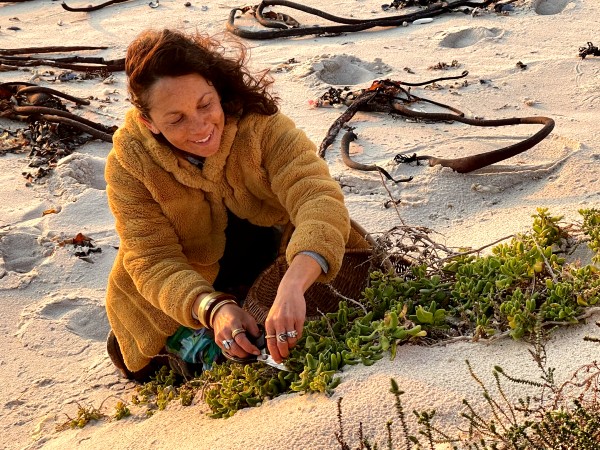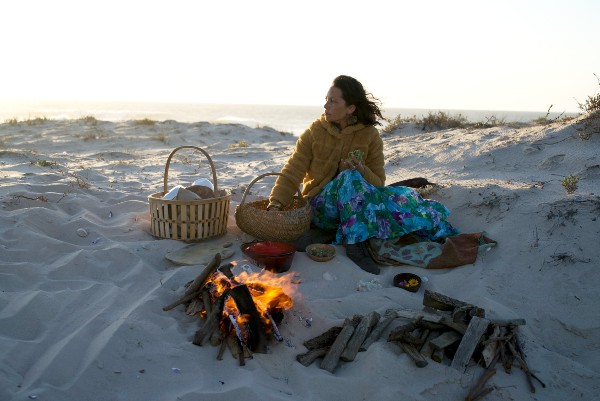News
Forager Roushanna Gray talks about kelp as a sustainable ingredient
Wednesday, November 23rd, 2022Mottainai is a Japanese expression meaning ‘do not be wasteful’. It is one of the Japanese principles that the Mazda brand is built on. At its core, Mazda is designed to create a soulful connection with the driver, motivated by the idea to live harmoniously with all things in and around us.
Not being wasteful also resonates deeply with wild food artist, foodie and avid forager, Roushanna Gray. She features in the Mazda Made With Soul series which highlights the passionate stories of select South African craftsmen and visionaries who align with the brand’s soulful premise.
Roushanna is the winner of the Spier Sustainability Award in 2019. Her wild food foraging platform, Veld & Sea is the 2022 restaurant winner in the Haute Grandeur Global Awards in two categories: Best Theme Restaurant and Best Garden Restaurant in South Africa.

Through Veld & Sea Roushanna cultivates a curiosity for our edible landscape. Using food as a tool for education, she shares her love for the wonder and value that our natural environment has to offer through immersive experiences, connection and creativity. She runs with the seasons and nature’s inspiration, letting whatever is growing in their garden and what is available seasonally in the wild dictate how the Veld & Sea menu is designed.
Sustainability is the motive and driving force behind Roushanna’s passion. Her favourite wild ingredient to forage and cook is Kelp. She loves it for many reasons.
“Kelp is a specific species of seaweed. We get a few different species here in SA. If we change the word from seaweed to sea vegetables, then it immediately changes our mindset. With the concept of sea vegetables in mind, a whole new culinary world opens.
“Kelp is the largest of all the seaweeds, so it is the most sustainable one to be harvesting. It is also one of the most sustainable seaweeds to forage because it grows so fast. It plays an integral part in the ocean and for marine life as it provides a habitat for a lot of creatures,” Roushanna says.

According to Two Oceans Aquarium, South Africa is only one of a few countries in the world with natural Kelp forests on its coast. Together with Namibia they’re the only African countries with Kelp forests.
Kelp is also a popular superfood touted for its disease fighting abilities.
“It is full of vitamins, minerals and micronutrients. And they are all readily available for our bodies to absorb because they are in a colloidal and chelated form,” Roushanna explains.
“Kelp is versatile. You can use it as both food and medicine in terms of its nutritional value. It’s interesting to play with it and incorporate it to food. I like to use it as a pasta substitute. It has a very similar texture. You can use it for tagliatelle or little noodles for a ramen broth. You can chop it up into lasagna sheets as well. Something that is beautiful about kelp is that it is full of umami – that magical fifth flavour. It has a natural msg called glutamic acid and that’s where that umami flavour lies. Anything that you add kelp to, will enhance it, whether it’s sweet or savoury,” she adds.
With attitudes towards foraging shifting due to our changing world and climate, thereby helping to mainstream the practice, Roushanna believes it is important to develop a reciprocal relationship with nature. A golden rule during her foraging experiences at Veld & Sea is to “pick only what you need and eat everything you pick.” This speaks to the Mottainai philosophy of not being wasteful and her advocacy to develop a reciprocity with the land and the ocean.
Roushanna believes that the future of foraging lies in learning lessons from our local indigenous edible plants and seaweeds.
“It’s important to learn how we can work with them more closely because they’re perfectly designed for our climate,” she says.
“Foraged items have become popular on many restaurant menus recently. It’s become fashionable to eat foraged foods. But I think when you forage from a non-renewable source and for mass or commercial value, it can quickly become depleted. So, it is very important to start cultivating our local indigenous edibles into farmers and growers markets. It would be incredible and amazing for growers that already supply the restaurant industry to turn to our indigenous ingredients and cultivate them. Then there’ll be greater awareness of how delicious, nutritious and beautiful they are. Kelp farming is going to be the answer. There’s interest in Kelp farming starting now. I firmly believe that Kelp and seaweed farming is the future for sustainable sea food,” Roushanna emphasizes.
Sustainability is a doing word – one that speaks to respect for nature. Working with technologies that are environmentally mindful, Mazda has been putting the word to practice for many years. Scrapped bumpers are successfully recycled into raw material for new vehicle bumpers since 2011, making Mazda the first automaker to do so. In this way, Mazda is helping to reduce wastage and echoing the essence of Mottainai.
For inspiration and more on the soulful connection between Mazda and food visionary, Roushanna Gray, go to the Mazda website.












